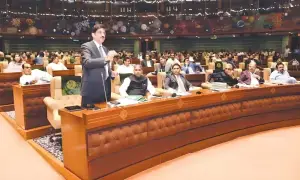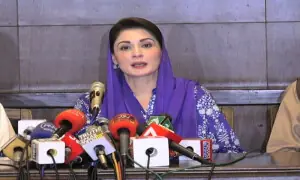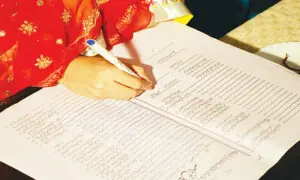WHO concerned over potential for second disaster in Pakistan
3 min readThe World Health Organisation has expressed concerns over the potential for a second disaster in Pakistan in form of an outbreak of waterborne diseases and malnutrition.
“A wave of disease and death following this catastrophe, linked to climate change, that has severely impacted vital health systems leaving millions vulnerable,” WHO Director General Tedros Adhanom Ghebreyesus said in a statement on Saturday.
His concern came as Prime Minister Shehbaz Sharif made a fresh appeal to support the flood victims who are in dire need of tents, clothes, food and blankets as “winter is coming” and they are sleeping under open skies.
The water supply has been disrupted, forcing people to drink unsafe water, which could spread cholera and other diarrhoeal diseases. Moreover, standing water enables mosquitoes to breed and spread vector-borne diseases such as malaria and dengue.
“Health centres have been flooded, their supplies damaged, and people have moved away from home which makes it harder for them to access their normal health services. All this means more unsafe births, more untreated diabetes or heart disease, and more children missing vaccination, to name but a few of the impacts on health,” said the WHO chief.
But, he added the international community could significantly reduce the impact of the impending crisis if it acted quickly to protect health and deliver essential health services. “Health workers in Pakistan are stretched to the limit as they do all they can to deliver critical services amid the destruction. Nearly 2,000 health facilities have been fully or partially damaged.”
Together with the government, UN and NGO partners, the WHO was setting up temporary health facilities and medical camps and helping to re-supply medicines to other health centres. “We are increasing disease surveillance so outbreaks can be detected early and people can get the treatment they need.”
It added that the government and partners were providing safe drinking water and access to toilets to lower the risks of disease from dirty water. WHO has provided water purification kits and oral rehydration salts to manage diarrhoeal diseases. Partners were also helping ensure safer housing and bed nets to protect against mosquitoes and the diseases they carry.
WHO had released $10 million from the WHO Contingency Fund for Emergencies which enabled the body to deliver essential medicines and other supplies.
“I thank the donors for their prompt response to the flash appeal,” he said, “We continue to assess the scale of the crisis and will issue a revised appeal shortly. I urge donors to continue to respond generously so that, together, we can save lives and prevent more suffering.”
Earlier, the United Nations Children’s Fund (Unicef) had said that floods triggered by heavy rains had left around 3.4 million children in need of assistance and at increased risk of “waterborne diseases, drowning and malnutrition.”
“Young children are living out in the open with their families, with no drinking water, no food, and no livelihood, exposed to a wide range of new flood-related risks and hazards, including from damaged buildings and drowning in floodwaters,” it said in a statement.
Unicef said that it was responding with the government and partners to support the flood-hit people. “We are also establishing temporary learning centres and supporting the protection and psychosocial wellbeing of children affected by these devastating floods,” it said, “but much more is needed to ensure we can reach all families displaced by floods and help them overcome this climate disaster.”
For the latest news, follow us on Twitter @Aaj_Urdu. We are also on Facebook, Instagram and YouTube.























Comments are closed on this story.